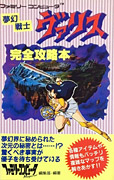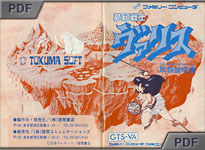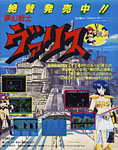|

|

|
|
夢幻戦士ヴァリス
©Tokuma Shoten 1987
©Telenet Japan 1987
Release: 1987-08-21 (¥5500)
Cartdridge GTS-VA
Platform/Action game
|
Mugen Senshi Valis is a side scrolling platform/action game by
Nihon Telenet and based on the original Valis released
for the PC88 and MSX Japanese computers. The game follows the
story of a Japanese school girl named Yūko Asao who, after receiving
the legendary sword of Valis, fights an epic battle between demons and
the people of the fantasy dream world of Vecanti. Her best friend
Reiko was abducted by the demon king Rogles and Yūko now embarks
on a long journey through the multiple dimensions of the mystic world to save
her and retrieve the five Valis gemstones. She starts the game
with her mystical sword and can fire small bursts of energy at her enemies.
She can also run, jump or crouch. However, this Famicom port of
Valis is not a traditional platform game (unlike the games it is based on).
Here, the player must navigate through non-linear and maze-like levels
that include countless exists, dead ends and loops. Although the first stage
features Yūko's hometown on Earth, the dream land that comes
later is vast and built around large interconnected worlds. Maps are
scattered throughout the game and greatly help Yūko in her quest
and prevent her from getting lost. Other special items can be collected along
the way by visiting townspeople. Some items are instantly activated (such
as the Medical Herbs or the Star Barrier) whereas others
are stored in Yūko's equipment for later use or activated as secondary
weapons - they range from the Float Boots, Spike Boots, Life Pots,
Power Boots, Shield, Cape, Bombs and so forth. Finally,
although the game features infinite continues, Yūko is automatically
sent to the beginning of an area when defeated.
|
|
A fan translated version of Valis was released in 2007 by Sliver X
and translated by Satsu.
This version, known as Valis ++, also fixes some of the terrible design flaws
that existed in the original game. It features a map that can be activated at any
time during gameplay by pressing Select. It is also overall easier, enemies
deal half of the damage they normally do and arrow-markers now alert players for Up
as well as Down exits.
|
Game Staff (Copied from the end credits) :
|
Producer
Hiroo Tochikubo
Kazuyuki Fukushima
Yuji Fukushima
Coordinator
Shigetoshi Takahashi
Director
Chuichi Fukushima
Technical Director
Satoshi Tanaka
Programmer
Masami Hanari
Game Designer
Denki Neko
|
|
Graphic Designer
Kohji Yokota
Tomomo Yoshii
Mitsuru Takahashi
Graphic Assist
Eiji Kikuchi
Akira Aoi
Ichiro Gamiike
Music Compose Arrange
Shinobu Ogawa
Sound Effect
Nobuhito Koise
Promoter
Tsutomu Ohtsuka
Yoshio Tsuboike
T.C.C.
Manual
Hiroshi Mizunuma
Hiroshi Nakamura
|
|
Test Play
Hiroyuki Kurano
Thanks
Sunrise
Mush Island
Joe Ashitano
Kinsan
Mr. Moo
Hiroshi Akahori
Oda Kiritaro
Special Thanks
Family Computer Magazine
©Tokuma Shoten 1987
©Telenet Japan 1987
|
|
|
G
O
O
D
I
E
S
|
|

Japanese Guidebook
|
|
|
O
M
A
K
E
|
|



|
|
|
Click on picture to enlarge |
|
|
|
LK

|
|
Add your Pov here !
|
P
O
V
s
|
|
Mugen Senshi Valis is a disaster. In truth, this version definitively
looks and sounds much better than the MSX and PC88 versions. Alas,
Telenet failed to capitalize of this technical feat and ruined the game
with questionable and inconsistent gameplay decisions. The maze-like levels are
atrocious and cause an extreme amount of undue pain and suffering. Most of the
screens are connected in really odd ways, creating an especially disorienting
gameplay experience. Then enemies keep respawning and attacking you, leaving you
little space to breathe - the worst offenders are definitively the ones that
appear from nowhere as you exist the screen! Finally, when you die, the game sends
you back to the beginning, which is utterly frustrating. That last gameplay flaw
was the nail in the coffin for me - this is a shame because the rest of the
game is fairly decent. So, unless you have a drive to own every single
Valis game even made, there is no much point purchasing this one...
|
|
|
|